Today, I received a huge Christmas package from my parents. It was stuffed with treats and goodies and warm socks for the cold winter days. The timing could not be better: Tonight is our house Christmas dinner. Partly because I didn't feel like it the last few days, I kept myself out of the planning of the night, but the more I learn to more I'm amazed. Tonight could challenge the real Christmas in scope, meal diversity and with Danish Julebryg. Many of my housemates are preparing a part of their families' traditional dishes, so I decided to make Plätzchen. The only English translation for the word is cookie, but I guess German Christmas cookies is as close as I can bring you. I loved helping my mum make these pre-Christmas every year. She loved making them too, I guess, which is why we had Plätzchen until February. I down-sized my Christmas bakery a little and sticked to one sheet of Angel Eye Cookies and two sheets of coconut macaroons. 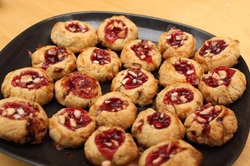 Angel Eye Cookies. photo: C. Wohlsperger I'm getting really excited about tonight, in fact. It's been a while since we all came together and I haven't spoken to some of my housemates in a long time. They are creating Christmas music playlists on facebook while I'm writing this.
Is it weird that today feels like Christmas? One month in advance, and there's no snow? But then again, how often is there snow on Christmas? And how often does Christmas feel like Christmas (last year it didn't...)? So I'll enjoy the Christmas anticipation for tonight as if it was the real thing.
The last couple of days, the word unmotivated understated my mood. A whole range of things played a role in that, but one significant one must be the desk in my room. The heating doesn't reach all the way into my 'office corner', the walls have moldy stains and the internet connection is at its lowest. And any attempt to work in bed is bound to fail.
The Statsbiblioteket Aarhus would be a great place to work in the weekends - but it's closed. The Danes are very strict with their opening hours. But I recently got the key card to one of the University buildings. So I went to the wonderful and pretty new Information and Media Science building. To my surprise, I wasn't all alone. Two other groups worked on presentations, one was prepared and brought a six pack of beer. The building is great: it's spacey and has comfortable furniture AND there's a pool table and hammocks in the basement. The only thing missing, as far as I noticed so far, is a coffee machine. In either case, it was quiet, I couldn't distract myself with too many other things, and I actually got much of the stuff done that I kept pushing away for over a week now.
And here's the thing: It's Sunday. Over the last half year, I became aware that my weekly rhythm individualized itself from the working world. The strict opening hour policies of Danish shops and public buildings confuses me. In Maastricht I even enjoyed the time I spent in the library with my housemates after Sunday dinner. And here, my rhythm is all messed up. All but this: Whatever my new Sunday is, it's not Sundays.
Last Thursday, my housemate Anja searched the entire place for paperclips. And found none. Again I was thinking of my mum who had (has?) the habit of picking up all those clips she found and making a necklace out of them. Since I was packing my bag for a weekend in Hamburg, and since there was a stop and the post office planned either way, I promised to buy paperclips. So apart from attending the Human(i)ties Perspectives Conference I had an actual purpose of going to Germany
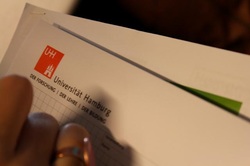 photo: C.Wohlsperger In Hamburg, our little big group (with 11 people, we were about 1/3 of the entire conference) listened to a lot of presentations on all sorts of issues ranging from publishing scientific books to becoming a correspondent to comparing tweets and feeds.
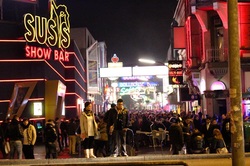 photo: C.Wohlsperger 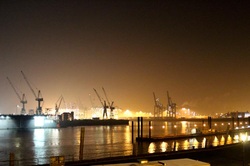 photo: C.Wohlsperger What I deemed far more interesting was that Hamburg is amazing! Since I will move to Hamburg next summer, yet have never been there, I was instantly relieved. And stunned. Of course we were lucky: the sun shone as brightly as we could hardly remember it could and everything (e.g. getting to the conference and back and forth and whatnot) went smoothly. It was a lot colder than in Aarhus, but we tried to keep warm with a few shots of Mexicanas in the evening, which for whatever dubious reasons are a real hype in Hamburg. Yet, during Friday and Saturday we mainly sat in presentations, and have shifted the sightseeing to the nighttime. We did the Reeperbahn and Schanzenviertel, the Fishmarket (conveniently connecting the sightseeing to a useful post-party snack) and danced in an old bunker that hosts a club called Übel und Gefährlich. Sprayed with confetti and a mild hangover, we decided to use the Sunday to walk around by daylight.
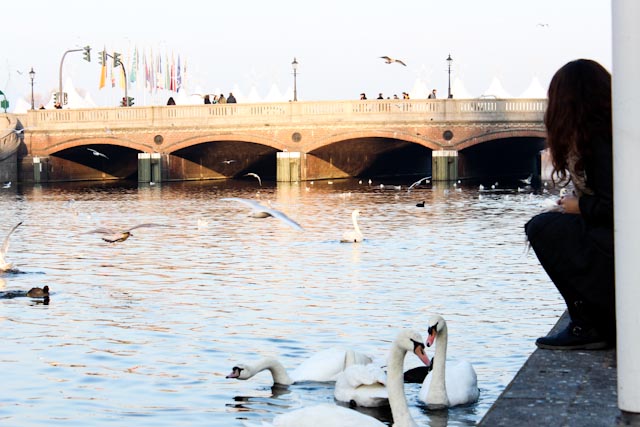 photo: C.Wohlsperger I didn’t tell anybody, but next to the Binnenalster, in front of the city hall, I found a paperclip. There were pigeons and seagulls and swans and a pianist played Phil Collins’ Another Day in Paradise. I decided to see this as a good start for Hamburg and me.
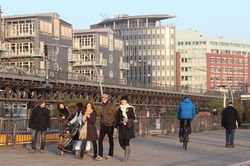 photo: C.Wohlsperger A little while later, the day was less than paradisical, because even daylight didn’t stop us from loosing Mia on the bridge to Harbour City. After about an hour of searching, guilt trips and worries (who said mobile phones are overrated??) we found her in the hotel lounge, with a cup of tea and a muffin. Everything turned out fine in the end; we had a car full of supermarket bags and luckily not checked at the border, and noticed that Hamburg is not even very far away from Aarhus. Perhaps there will be a next time soon.
Yesterday, I found a paperclip again. It was not a spectacular one, but it was in our street. And it is spectacular to even see the pavement under the heaps and heaps of golden leaves. Two days ago, when I walked to University, a man had apparently slipped on the foliage with his bike and crashed against a tree. Several people were already there, and the ambulance arrived the moment I passed by. A little down the road, and about a month earlier, two cars crashed into each other, but I’m sure that had little to do with the leaves. But maybe our street is a little haunted… Just on Halloween, Sanna broke the news to us that in 1994, a spree killing happened at Aarhus University. And where? In the Trojborg buildings, in our street. Flemming Nielsen shot two young women in the cafeterias before killing himself in a basement bathroom. ( http://drabssageridanmark.beboer2650.dk/html/drabssager_-_1994.html) Passing by at nighttime on the 2nd of November had a whole new excitement to it.
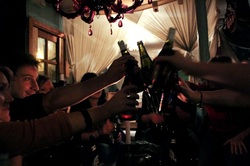 photo: C. Wohlsperger Last Friday was J-Day. Julebryg-Day. Christmasbeer-Day. Every first Friday in November, Tuborg releases its Christmas brew. Trucks drive around town and deliver crates of “Royal X-Mas” to bars, where Santa’s helpers hand out the bottles. Needless to say, it’s a big deal. Although Denmark has – in Skandinavian comparison – relatively low alcohol prices, who would say no to a free beer? So more people than usually were abouts in Aarhus even at 8:30pm. One must be in time, because Royal X-Mas strikes at 8:59 sharp. As adaptive as we international students are, we decided to join the frenzy.
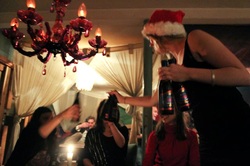 photo: C. Wohlsperger Girls in Sexy-Santa dresses indeed gave us free beer after we had waited for an hour (we were misinformed and thought the brew would start flowing at 8pm), Jingle Bells and Last Christmas were blasted and the few other guests who were already at the bar were singing, dancing, falling all over. Only one of us managed to drink his stout fast enough to catch a free second round, but it turned out that the Christmas brew is cheaper than others.
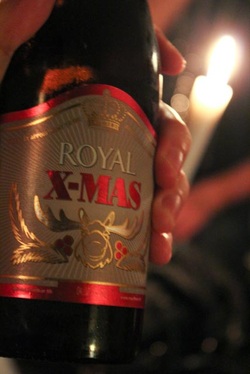 photo: C. Wohlsperger Except for the free beer and seeing drunken Danes, J-Day means that here, Christmas is officially starting. Yesterday I considered buying an advent calendar in the supermarket, because it didn’t occur to me that there is an entire months to go before December even starts. The holiday season will be a long one this year. At least, there will be Julebryg throughout.
50 years ago, tens of thousands of Turkish men (and women, as I was just informed) entered Germany to work. 50 years ago, the first Turks entered a country that wasn’t entirely Zen with itself yet. The Second World War had left deep scars with the German population, and if one can’t entirely make sense of one’s self, how is one supposed to make sense with some one else? But the economy was booming and the employees were “needed”, although not wanted. Germany never perceived itself as an immigration country, let alone an immigration society. So when the 1961 treaty ended in 1973, and 3 out of 14 million Turkish men did not leave, Germany was puzzled. The men brought their families, but the schools weren’t prepared, the government wasn’t prepared, there was no such thing as integration. Instead, the word Leitkultur was invented. Rather than integration, a pessimistic multicultural set in: Coexistance appeared better than mingling. Integration improved over the decades, the shifts of generations helped; but is that really the whole picture?
Germany pretended not to be an immigration country, but it is. And it has been. Apparently, we’re just not spontaneous enough to notice. But there is willingness to debate. For instance, after Angela Merkel declared multiculturalism in Germany a failure (see above). Or when Thilo Sarrazin published “Deutschland – ein Land schafft sich ab”. Yet there’s more than political and intellectual debate. Since the 1990’s, numerous German-Turkish comedians, TV-hosts and film directors emerged, some with wide success, like Fatih Akin. In 2006, the TV series “Türkisch für Anfänger” was a great success, picking up on everyday topics in a German-Turkish patchwork family.
Over the last few days, much has been said and written about the lives of Deutschtürken. But just as little as there was a handshake between the German and Turkish heads of state in 1961 (there was none – only letters), there is appreciation for what Germany has achieved. Needless to say, much more needs to be done. But given that Germany was still under shock when (un-) welcoming the Turkish workers, and was still under shock when some stayed, and has done innumerous mistakes concerning integration policies (ranging from separate Turkish school classes to Einbürgerungstests), there are myriads of examples of Deutschtürken that are perfectly fine and that mingle. On top of that, Germans finally seem to finde a national identity that they are comfortable with. And as much as is now accredited that Germany and its Germans influenced and changed the Turkish immigrants, there must be the realization that Germany has been transformed just as much. We are not a country of Germans and Germans only. We are a country of hybrids: Germans that are deutschtürkisch, deutschrussisch, deutschpolnisch, deutschitalienisch and so on and so forth. Slowly but surely, we are getting used to the thought. Raising the question of whether it’s a good or a bad thing to have immigrants is like asking if it’s good or bad to be here at all. 50 years and a positive twist over the past decades are reason enough to celebrate.
|









 RSS Feed
RSS Feed